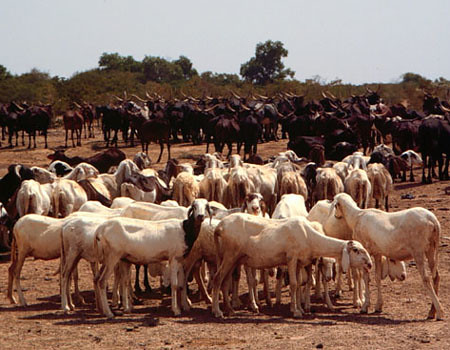 |
| Orma Boran cattle crossing a river in Kenya. The new Dynamic Drivers of Disease Consortium will integrate understanding of zoonoses, ecosystems and wellbeing (photo credit: ILRI/Dolan). |
Dynamic Drivers of Disease in Africa is a new Ecosystem Services for Poverty Alleviation (ESPA)-funded research program that seeks to integrate our understanding of zoonoses, ecosystems and wellbeing. The 3.5 year program runs until July 2015 and focuses on four emerging or re-emerging zoonotic diseases in four diverse African ecosystems:
The Drivers of Disease Consortium comprises over 30 researchers working in 17 institutes across Africa, Europe and the US and includes researchers in the environmental, biological, social, political, and human and animal health sciences. They will generate new knowledge on:
- Henipavirus infection in Ghana
- Rift Valley fever in Kenya
- Lassa fever in Sierra Leone
- Trypanosomiasis in Zambia and Zimbabwe
The Drivers of Disease Consortium comprises over 30 researchers working in 17 institutes across Africa, Europe and the US and includes researchers in the environmental, biological, social, political, and human and animal health sciences. They will generate new knowledge on:
- Ecosystem change
- How ecology and people’s interactions with ecosystems affect disease emergence
- Disease transmission and exposure
- ESRC STEPS Centre, Brighton, UK
- University of Cambridge, UK
- Institute of Zoology, London
- University of Edinburgh
- University College, London
- Wildlife Division of the Forestry Commission, University of Ghana
- International Livestock Research Institute (ILRI), Kenya
- Kenya Medical Research Institute (KEMRI)
- University of Nairobi
- Kenema Government Hospital, Sierra Leone
- Njala University, Sierra Leone
- Ministry of Livestock and Fisheries Development, Zambia
- University of Zambia
- Ministry of Agriculture, Mechanisation and Irrigation Development, Zimbabwe
- University of Zimbabwe
- Stockholm Resilience Centre
- Tulane University, USA


